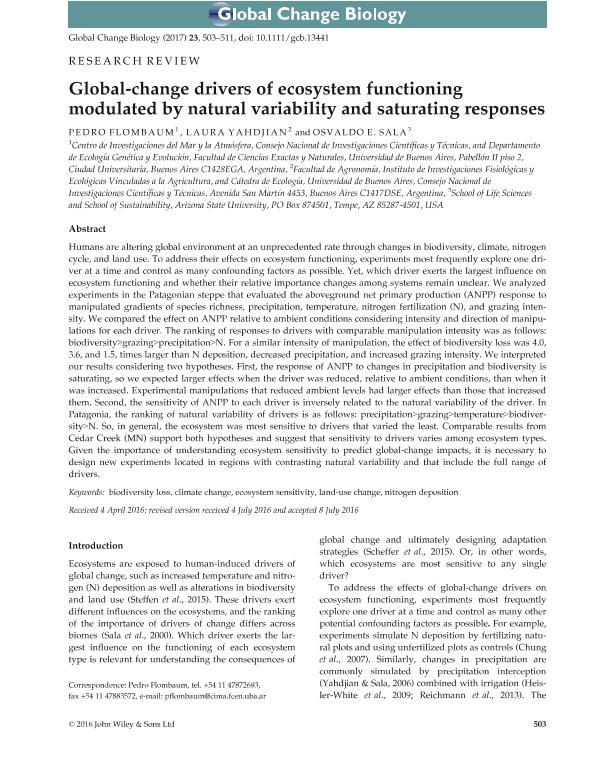Mostrar el registro sencillo del ítem
dc.contributor.author
Flombaum, Pedro

dc.contributor.author
Yahdjian, María Laura

dc.contributor.author
Sala, Osvaldo Esteban

dc.date.available
2018-09-07T18:43:31Z
dc.date.issued
2017-02
dc.identifier.citation
Flombaum, Pedro; Yahdjian, María Laura; Sala, Osvaldo Esteban; Global-change drivers of ecosystem functioning modulated by natural variability and saturating responses; Wiley Blackwell Publishing, Inc; Global Change Biology; 23; 2; 2-2017; 503-511
dc.identifier.issn
1354-1013
dc.identifier.uri
http://hdl.handle.net/11336/58777
dc.description.abstract
Humans are altering global environment at an unprecedented rate through changes in biodiversity, climate, nitrogen cycle, and land use. To address their effects on ecosystem functioning, experiments most frequently explore one driver at a time and control as many confounding factors as possible. Yet, which driver exerts the largest influence on ecosystem functioning and whether their relative importance changes among systems remain unclear. We analyzed experiments in the Patagonian steppe that evaluated the aboveground net primary production (ANPP) response to manipulated gradients of species richness, precipitation, temperature, nitrogen fertilization (N), and grazing intensity. We compared the effect on ANPP relative to ambient conditions considering intensity and direction of manipulations for each driver. The ranking of responses to drivers with comparable manipulation intensity was as follows: biodiversity>grazing>precipitation>N. For a similar intensity of manipulation, the effect of biodiversity loss was 4.0, 3.6, and 1.5, times larger than N deposition, decreased precipitation, and increased grazing intensity. We interpreted our results considering two hypotheses. First, the response of ANPP to changes in precipitation and biodiversity is saturating, so we expected larger effects when the driver was reduced, relative to ambient conditions, than when it was increased. Experimental manipulations that reduced ambient levels had larger effects than those that increased them. Second, the sensitivity of ANPP to each driver is inversely related to the natural variability of the driver. In Patagonia, the ranking of natural variability of drivers is as follows: precipitation>grazing>temperature>biodiversity>N. So, in general, the ecosystem was most sensitive to drivers that varied the least. Comparable results from Cedar Creek (MN) support both hypotheses and suggest that sensitivity to drivers varies among ecosystem types. Given the importance of understanding ecosystem sensitivity to predict global-change impacts, it is necessary to design new experiments located in regions with contrasting natural variability and that include the full range of drivers.
dc.format
application/pdf
dc.language.iso
eng
dc.publisher
Wiley Blackwell Publishing, Inc

dc.rights
info:eu-repo/semantics/openAccess
dc.rights.uri
https://creativecommons.org/licenses/by-nc-sa/2.5/ar/
dc.subject
Biodiversity Loss
dc.subject
Climate Change
dc.subject
Ecosystem Sensitivity
dc.subject
Land-Use Change
dc.subject
Nitrogen Deposition
dc.subject.classification
Otras Ciencias Biológicas

dc.subject.classification
Ciencias Biológicas

dc.subject.classification
CIENCIAS NATURALES Y EXACTAS

dc.title
Global-change drivers of ecosystem functioning modulated by natural variability and saturating responses
dc.type
info:eu-repo/semantics/article
dc.type
info:ar-repo/semantics/artículo
dc.type
info:eu-repo/semantics/publishedVersion
dc.date.updated
2018-09-07T13:44:07Z
dc.journal.volume
23
dc.journal.number
2
dc.journal.pagination
503-511
dc.journal.pais
Reino Unido

dc.journal.ciudad
Londres
dc.description.fil
Fil: Flombaum, Pedro. Consejo Nacional de Investigaciones Científicas y Técnicas. Oficina de Coordinación Administrativa Ciudad Universitaria. Centro de Investigaciones del Mar y la Atmósfera. Universidad de Buenos Aires. Facultad de Ciencias Exactas y Naturales. Centro de Investigaciones del Mar y la Atmósfera; Argentina
dc.description.fil
Fil: Yahdjian, María Laura. Consejo Nacional de Investigaciones Científicas y Técnicas. Oficina de Coordinación Administrativa Parque Centenario. Instituto de Investigaciones Fisiológicas y Ecológicas Vinculadas a la Agricultura. Universidad de Buenos Aires. Facultad de Agronomía; Argentina. Universidad de Buenos Aires. Facultad de Ciencias Exactas y Naturales. Departamento de Ecología, Genética y Evolución. Cátedra de Ecología General; Argentina
dc.description.fil
Fil: Sala, Osvaldo Esteban. Consejo Nacional de Investigaciones Científicas y Técnicas; Argentina. Arizona State University; Estados Unidos
dc.journal.title
Global Change Biology

dc.relation.alternativeid
info:eu-repo/semantics/altIdentifier/doi/https://dx.doi.org/10.1111/gcb.13441
dc.relation.alternativeid
info:eu-repo/semantics/altIdentifier/url/https://onlinelibrary.wiley.com/doi/abs/10.1111/gcb.13441
Archivos asociados
